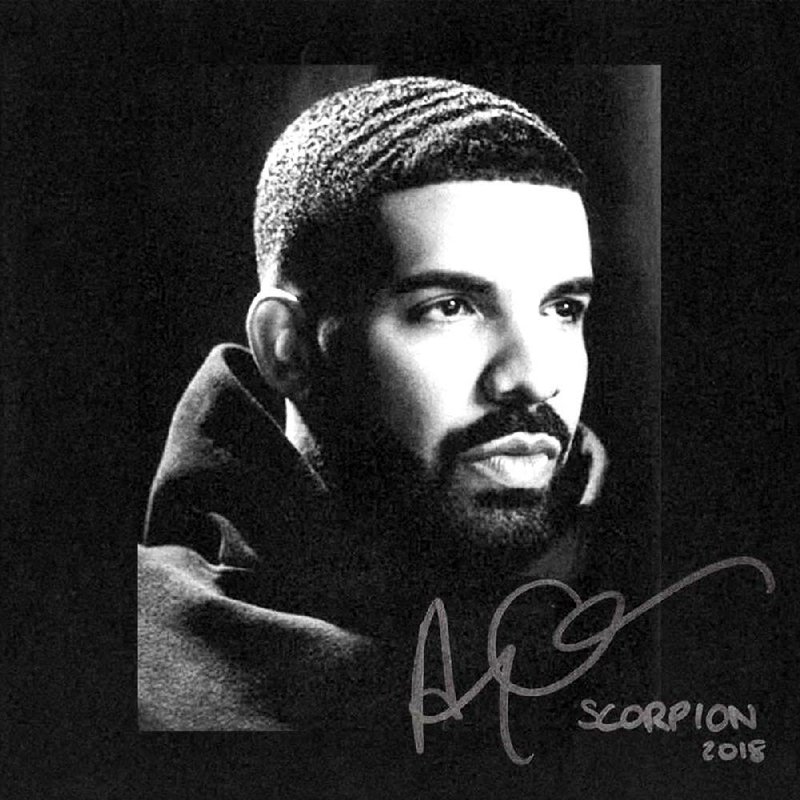B- Drake
Scorpion
Young Money/Republic
Drake breaks character only once on this 25-song, 90-minute double album. It comes on the last track, "March 14," which addresses the fact that the 31-year-old superstar is now a father.
"Sandi used to tell me all it takes is one time/And all it took was one time," he raps, repeating his mother's cautionary advice. After that, the deluge: "We only met two times/Two times!" That last phrase -- the repetition, the way Drake's voice rises and untethers -- is the only acknowledgment that the most consummately controlled figure in pop music not named Taylor Swift is still able to be caught off guard.
Not that Drake's career has not been without anxieties and challenges. But over the past decade he has become the genre's most sophisticated chess player, a rap strategist who understands the way offense and defense depend on each other. Jay-Z, Lil Wayne, even to some degree Kanye West -- often appeared above the fray, but Drake's broad-spectrum success has come because of his willingness to be attacked or undermined, his acceptance that part of ascending is the gravitational pull downward.
Reckoning with the responsibilities of new parenthood, untangling a brief liaison that became a lifelong bond -- these are the sorts of subjects that would ordinarily animate great Drake music.
But Scorpion is safer and less ambitious, largely a reprocessing of old Drake ideas and moods. It is largely a reminder of Drake's past, and perhaps an attempt at maintaining stability in the face of profound emotional disruption.
Scorpion is split into two: in the first, largely rapped half, men cause him the most aggravation. In the second, largely sung, it's women.
Plenty of artists make songs that sound like their old hits, a strategy that concedes creative defeat while maintaining commercial dominance. Drake does something different. He is gifted at making songs that aren't near-exact tracings of his old ones, but employ his now-familiar grammar to recall moments you loved so long ago that you've internalized them. These new songs arrive like a sense memory, not a new feeling.
Scorpion is full of songs like this: "Jaded," which oozes moping sentiment; the chest-beating "Sandra's Rose," "Emotionless," built on a fractured Mariah Carey sample. The album underscores how integral the warm keyboards by Drake's main producer, 40, have been to his success, and how they are a perfect complement to Drake's soothing, slippery syllables. Though less preoccupied with new sounds than Drake's recent work, there are still strong shades of Memphis ("Talk Up") and New Orleans ("Nice for What") sprinkled throughout.
But Drake is less concerned with fully polished songs. Several feel rushed, with lyrics a notch too plain. The album's length is not an asset, regardless of whether it's a maximalist streaming strategy, a pointed rebuke to certain artists' increasingly brief albums, or perhaps the fulfillment of a contractual obligation, or perhaps bloat.
Perhaps most worryingly, the split album relies on a false binary of Drake's rapping and singing sides, his tough and tender approaches. What made Drake singular through the first half of his career was his insistence that those two impulses were necessarily intertwined. Atomizing them into halves does them both a disservice.
In truth, these Drakes are the same: the man who suffers, the uncertain playboy, the tortured boy king. Though he's been involved with high-profile beefs, his responses here are largely subdued -- teaming with Jay-Z on "Talk Up," or "8 Out of 10," which sounds like a taunt at West, lyrically and musically.
In this album's high moments, vintage Drake feels fresh. "After Dark" is the peak, a feast of male tenderness that's a collaboration with Ty Dolla Sign and Static Major (who died in 2008), and anchored by a speech by a quiet storm radio DJ. Drake is still capable of acute emotional observation, like on "Is There More": "I only tell lies to who I gotta protect/I would rather have you remember me how we met/I would rather lose my leg than lose their respect."
Here, he is fueled by anxiety, sometimes of his own making. His son was born last October, and part of the job of Scorpion is to confirm that news and also to add new fatherhood to the list of existential Drake concerns.
But Drake doesn't make it central. Only "March 14" is wholly dedicated to the subject ("I got an empty crib in my empty crib"). Given that Drake has made his career by putting his most vulnerable sentiments on display, the lack of candor here is notable. Maybe, for once, the feelings were too raw.
Hot tracks: "After Dark," "Is There More," "March 14"
-- JON CARAMANICA
New York Times
B Nine Inch Nails
Bad Witch
The Null Corporation
The abrasively distorted opener "S- Mirror" is uncharacteristically followed by hyperactive neo-drum 'n' bass ("Ahead of Ourselves") and free-jazz horns that come together memorably on the squelchy advance single "God Break Down the Door." On that song and the closing "Over and Out," Trent Reznor croons like none other than his onetime collaborator David Bowie, whose latter-day albums, particularly Earthling and Blackstar, Bad Witch pays homage to.
If only the droning final two tracks, making up nearly half the 30-minute running time, were any good.
Hot tracks: "Over and Out," "God Break Down the Door"
-- DAN WEISS
The Philadelphia Inquirer (TNS)
Style on 07/10/2018

